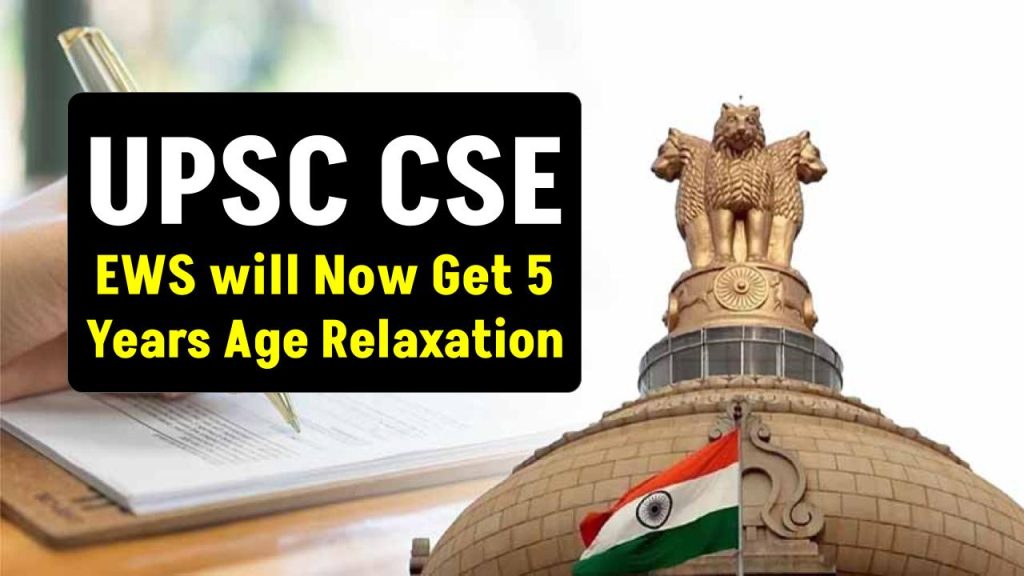
In a major decision, the Madhya Pradesh High Court has granted Economically Weaker Section (EWS) candidates a 5-year relaxation in the upper age limit for the Union Public Service Commission (UPSC) Civil Services Examination (CSE) 2025. This brings their age limit in line with Other Backward Classes (OBC), Scheduled Castes (SC), and Scheduled Tribes (ST), allowing them to apply up to the age of 37 instead of the previous 32 years.
Additionally, EWS candidates will now be allowed nine attempts at the exam, similar to OBC candidates. However, there’s a big catch—this relaxation is currently only an interim measure, and UPSC has not yet officially changed its age criteria. The court has stated that while EWS candidates can apply under relaxed rules, their results will be subject to the court’s final decision.
UPSC CSE 2025
| Feature | Previous Rule for EWS | New Rule (Interim Order) |
|---|---|---|
| Upper Age Limit | 32 years | 37 years |
| Number of Attempts | 6 attempts | 9 attempts |
| Finality | UPSC’s official rule applied | Only applicable until the final court verdict |
| Court Decision Impact | No relaxation earlier | Results will be subject to final court decision |
| Application Process | As per UPSC’s original guidelines | UPSC must accept applications with relaxation |
Official UPSC Website for the latest updates.
The Madhya Pradesh High Court’s decision to grant EWS candidates a 5-year age relaxation and additional attempts for UPSC CSE 2025 is a welcome move for many aspirants. However, this is only an interim order, and its final implementation depends on the court’s final verdict.
EWS candidates should apply under the relaxed criteria but remain prepared for possible changes in case the decision is overturned. Keeping track of UPSC notifications and court updates is crucial for staying informed.
Also Check: How Much Should You Contribute to Your 401(k)? Don’t Miss This Key Number!
UPSC CSE 2025: What Led to This Decision?
This development comes after a petition filed by Aditya Narayan Pandey from Maihar, Madhya Pradesh. The petitioner argued that EWS candidates were being unfairly treated the same as General category candidates in terms of age limit and the number of attempts, despite being recognized as a reserved category.
The Madhya Pradesh High Court acknowledged this disparity and ruled in favor of EWS candidates, granting them a 5-year age relaxation and additional attempts to create a level playing field.
UPSC CSE 2025: What This Means for EWS Aspirants
This ruling is a temporary relief for EWS candidates who were struggling with the strict eligibility criteria. Here’s how this impacts them:
More Time to Prepare – With the new upper age limit of 37 years, many aspirants who had exhausted their attempts earlier can now reappear.
More Attempts – The increase from 6 to 9 attempts allows aspirants to improve their strategy and performance over multiple attempts.
Better Representation – This decision acknowledges that economic disadvantages also create barriers in education and competitive exams, justifying additional support for EWS candidates.
Also Check: Trust Funds 101: Everything You Need to Know to Secure Your Wealth!
UPSC CSE 2025 The Catch: It’s Not Permanent (Yet!)
While the court’s order is a significant step, it is important to understand that:
This is only an interim order – The final ruling is yet to be decided.
UPSC has not officially changed the rules – The relaxation applies only under court orders.
Appointment Orders Are On Hold – Even if an EWS candidate clears the exam under this relaxation, the court must approve their final appointment.
This means that EWS candidates must proceed with caution, as the final decision could reinstate previous rules, affecting their eligibility.
UPSC CSE 2025: How to Apply for UPSC CSE 2025 Under the New Relaxation?
If you are an EWS candidate, here’s how you can proceed:
Check Your Eligibility
- You must meet the EWS criteria set by the government.
- Your age must be below 37 years (as per the interim order).
- You must not have exceeded 9 attempts.
Submit Your Application
- Visit the UPSC official website.
- Fill out the UPSC CSE 2025 application form.
- Upload the required documents, including the EWS certificate.
Keep Track of Court Updates
- Follow updates from the Madhya Pradesh High Court and UPSC.
- Be prepared for possible changes if the court overturns the decision.
UPSC CSE 2025: Why EWS Needed Age Relaxation
The EWS category was introduced in 2019, providing a 10% reservation for economically weaker candidates without caste-based reservations. However, they were not given the same benefits as SC, ST, and OBC candidates in terms of age relaxation and attempts.
Many aspirants argued that economic disadvantages also impact access to coaching, study materials, and preparation time. Granting them age relaxation and extra attempts ensures fairer competition.
Also Check: 3 Big RMD Rule Changes – Don’t Get Caught Off Guard! (Required Minimum Distribution (RMD))
UPSC CSE 2025 (FAQs)
What is the new age limit for EWS candidates in UPSC CSE 2025?
The upper age limit is now 37 years, compared to the previous 32 years, as per the Madhya Pradesh High Court’s interim order.
Has UPSC officially changed the age limit for EWS?
No. This is a court-directed relaxation and not an official UPSC rule. The final verdict is still pending.
How many attempts do EWS candidates now have?
EWS candidates now have 9 attempts, compared to 6 attempts earlier, as per the interim order.
Can EWS candidates apply under this rule now?
Yes, UPSC has been directed to accept applications under this relaxation. However, the final results will depend on the court’s final decision.
What happens if the court overturns this order?
If the court reverses the decision, then the previous rules (32 years age limit and 6 attempts) will apply again. Those who applied under the interim relaxation may lose their eligibility.
Where can I check official updates?
You can visit the UPSC official website and follow the latest court rulings for updates









